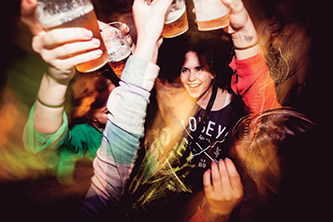Psychology: Parental Influence
Heavy alcohol use by college students can lead to a number of alcohol-related problems, including increased chances of risky behavior. Parents play a crucial role in shaping student perceptions about alcohol consumption and are an important factor when targeting alcohol use and related consequences in college students, according to research by psychologist Lucy Napper.
Napper, assistant professor, examines students’ alcohol behaviors and parents’ influence on alcohol use.
“Up until about 10 years ago, people thought parents’ influence waned when their children went off to college and peers were the primary social influence on drinking,” says Napper, who is also a member of Lehigh’s community health research groPsychup. “That’s true in that peers have a significant influence on drinking, but more recent research has shown that parents can have a direct influence on their student’s alcohol use and also possibly moderate the influence of peers.”
Her data backs this up. She recently studied a group of parents of college students and their perceptions regarding student alcohol use, student alcohol approval, parent alcohol approval and intentions to discuss alcohol use with their student. The parents were provided with information regarding student alcohol use and other parents’ alcohol approval. After receiving the information, parents were less confident in their knowledge of their student’s alcohol use, believed that their student drank in greater quantity and more frequently than before and reported stronger intentions to talk to their student about alcohol.
Both parents’ communication about alcohol and their own attitudes toward alcohol can influence student drinking behaviors. Students who see their parents as being approving of alcohol use tend to drink more and experience more negative consequences, she notes. Napper also examines students’ perceptions of alcohol use. Students tend to overestimate how much other students drink and how much peers approve of alcohol use, she says.
“When you have these misperceptions where you think everyone else is drinking, this can influence students to engage in more risky drinking behaviors. Providing students with feedback that corrects these misperceptions and lets them know that people don’t drink as much as they think can help them reflect on their own attitudes and rethink their drinking behaviors.”
Posted on:


